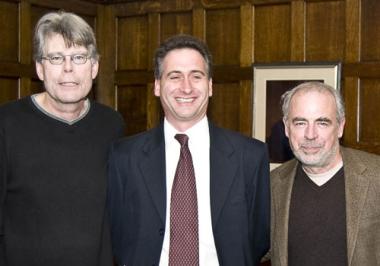Several weeks ago, an event at Mt. Holyoke drew a standing-room-only crowd. Over one thousand people from Western Mass. and out of state streamed into Chapin Hall to hear Stephen King and Richard Russo talk about writing. King hasn't made a public appearance for the last 10 years.
Over $18,000 was raised for the Food Bank, a 26-year-old nonprofit organization which provided 6.4 million pounds of food—the equivalent of 5 million meals— to more than 100,000 people in Western Massachusetts last year through a 400-member-strong local emergency food network of pantries, meal sites, shelters and other social service programs.
Emily Russo, an employee of the Odyssey Bookshop, the organizer of the event, pulled some strings to get her father, Richard Russo, and his friend and neighbor Stephen King to make an appearance at Mt. Holyoke. The Odyssey did a brisk business selling King's latest book of short stories, Just After Sunset, and Russo's recent novel, Bridge of Sighs.
A story called "N" in King's new book outlines the following scenario: the Maine countryside is faced with apocalyptic threat due to the irrational thinking of a psychiatric patient. The potential to save the area from such a fate lies in the thought process of said psychiatric patient.
The Valley and the U.S. are also under threat. According to area bakers and restaurant owners, the prices of grain and dairy products are up 40 percent. According to the U.S. Department of Agriculture, milk and bread prices for consumers are up 14 percent. According to the Food Bank, demand is up at food pantries and shelters and will climb in the winter months.
Kicking off the presentation, Food Bank executive director Andrew Morehouse reiterated both his agency's missions: "to work with our community to reduce hunger and increase food security." Here is more of what he has to say about hunger in the Valley and hunger in general.
Valley Locavore: The moderator at the event introduced Steven King first by reminding the audience that the author got his big break after Carrie was rescued from of the trash by King's wife, Tabitha. He followed with King's famous quote about writing fiction—that 'lying' is part of the job of the writer, the goal of the writer is to find the truth of the lie. What is the lie when it comes to hunger?
Andrew Morehouse: That there is a scarcity of food. The truth is that there is an abudance of food. In this country, we distribute food on the basis of people's ability to pay, not on demand.
Access to food is a basic human right. All people should be able to eat whether they can pay for it or not. In fact, all people should have enough income—either through earnings and/or public supports—to meet this basic need. It's the right thing to do morally and it also makes economic sense because when everyone has purchasing power to buy food, this stimulates economic growth locally.
VL: What are you seeing this year at some of the agencies you are serving?
AM: Our costs for food staples have increased by 20 percent. In the first six months of this year alone, we've seen a 17 percent increase over the same period last year in the number of people receiving food from the emergency food network. And this was before the financial crisis hit and before the heating season, when folks really feel the pinch between paying for heating and food. For example, representatives from Kate's Kitchen in Holyoke, the Center for Self Reliance in Greenfield and the Community Survival Center Food Pantry in Indian Orchard are witnessing an increase in families and individuals who depend on food donations from the Food Bank and others.
VL: Besides volunteering, what can people do to contribute to the Food Bank?
AM: Financial donations are always welcome. They have an impact you might not expect. Because we purchase and receive so much food in such a high volume, we get economy of scale. For every dollar you donate, we leverage $8 worth of food.
VL: What is the Food Bank doing to meet the challenges caused by the rising cost of food?
AM: We're advocating and educating the public on food policy, such as the need to establish a Massachusetts Food Council Policy Program… that will support initiatives that ensure sustainability for area farms and support efforts that provide better access to food. For example, in Springfield, there is no grocery store in the [Winchester] Square district, only convenience stores. We are working on getting a supermarket built there. Having a policy in place will help that kind of effort.
VL: Is the government looking at this problem?
AM: You can hear about that at our upcoming annual meeting. Professor Donald Shepard at Brandeis University will discuss the findings of a report called The Economic Costs of Domestic Hunger. Shepard is one of its authors. On November 20 at 5:30, he'll be at our Hatfield location. All are welcome.
VL: What is in the report?
AM: Every year, 35 million people go hungry in this country. Professor Shepard will discuss the report's findings, which reveal how additional annual expenditures of around $12 billion dollars can eliminate the current $90 billion-per-year cost of hunger in the U.S.



